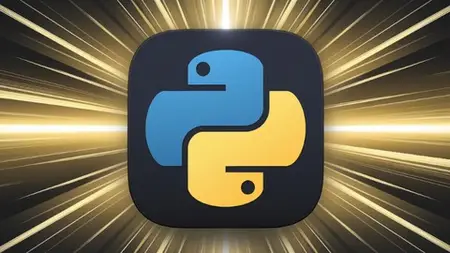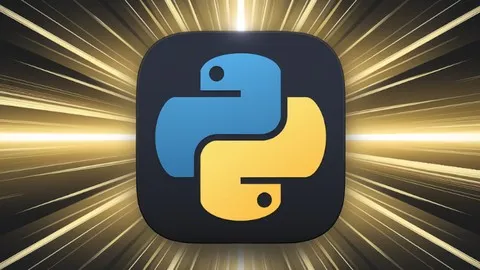Master Python: From Beginner To Advanced Projects
Published 11/2024
MP4 | Video: h264, 1920x1080 | Audio: AAC, 44.1 KHz
Language: English | Size: 589.07 MB | Duration: 2h 9m
Published 11/2024
MP4 | Video: h264, 1920x1080 | Audio: AAC, 44.1 KHz
Language: English | Size: 589.07 MB | Duration: 2h 9m
Learn Python programming, build real-world projects, master OOP, SQL, and create professional documentation.
What you'll learn
Set up and use PyCharm IDE effectively to create, debug, and run Python projects.
Understand Python’s basic syntax, variables, loops, conditionals, and error handling.
Master essential Python data structures such as lists, tuples, dictionaries, and sets.
Write clean, maintainable code using PEP 8 guidelines and modular programming principles.
Use Google-style docstrings and Sphinx to create professional project documentation.
Build real-world projects like a fitness tracker and a dice game, showcasing modular design and reusability.
Understand object-oriented programming concepts, including inheritance, polymorphism, and encapsulation.
Work with relational databases by designing schemas, performing CRUD operations, and writing advanced SQL queries.
Use SQL transactions to ensure data consistency and integrity in database operations.
Visualize and design software systems using UML diagrams such as class, sequence, and activity diagrams.
Generate automated documentation for projects using Sphinx and manage its configuration.
Gain confidence in debugging code with breakpoints, step-throughs, and error identification techniques.
Handle user input safely and implement robust input validation in Python applications.
Learn advanced Python concepts such as magic methods, operator overloading, and decorators.
Develop skills to structure Python projects with modules, packages, and good design principles.
Requirements
No prior programming experience is needed—this course is designed for absolute beginners.
A computer with Windows, macOS, or Linux operating system.
An internet connection to download tools and follow along with the course.
A willingness to learn and explore Python programming step by step.
Description
Welcome to "Master Python: From Beginner to Advanced Projects"!This course is designed to take you from an absolute beginner to a proficient Python programmer. Whether you're just starting out in programming or looking to enhance your Python skills, this course will guide you through all the essential concepts and real-world applications.We start from the basics, covering Python syntax, data types, and foundational programming concepts, so even if you’ve never written a line of code before, you’ll feel comfortable right from the start. You'll learn how to work with variables, operators, and functions, as well as how to write clean, readable code. The course will also introduce you to Python’s built-in functions and modules, enabling you to handle a wide variety of tasks with ease.As you progress, we dive deeper into more advanced topics such as Object-Oriented Programming (OOP), which will teach you how to organize and structure your code effectively. You’ll also learn to interact with databases using SQL, create UML diagrams for software design, and write professional-grade documentation using Google-style docstrings.In addition to the core programming concepts, you’ll work on hands-on projects that will give you real-world experience. You will create a Fitness Tracker and a Dice Game, both of which will help you solidify your understanding by building fully functional applications. These projects will cover everything from setting up your development environment to writing the code and testing your program.This course also emphasizes best practices, such as adhering to the PEP 8 guidelines for writing clean, maintainable code, and learning how to document your work effectively. You'll also explore automated documentation generation using tools like Sphinx to create professional-level project documentation.Key features of this course include:Beginner-friendly content that assumes no prior programming experience.Hands-on projects that cover both simple and advanced Python applications.Clear explanations of fundamental programming concepts and advanced techniques.Best practices and industry standards to make sure your code is clean, efficient, and maintainable.Real-world applications like a fitness tracker and a dice game.In-depth coverage of Object-Oriented Programming (OOP) and relational databases with SQL.By the end of this course, you will be able to confidently tackle Python programming tasks, build functional applications, and work with databases and OOP. You’ll also know how to write clean code, document your projects, and implement key programming concepts in your day-to-day work.
Overview
Section 1: Getting Started with PyCharm IDE
Lecture 1 Installing PyCharm on Windows
Lecture 2 Setting Up Your First Project in PyCharm
Lecture 3 Creating and Running Your First Python File
Lecture 4 Mastering Debug Mode: Breakpoints, Step Over, and Step Into
Section 2: Essential Programming Concepts in Python
Lecture 5 Basic Python Syntax: Your First Steps in Programming
Lecture 6 Python Numbers and Math Operators: A Beginner’s Guide
Lecture 7 Working with Strings: Variables, Operators, and Practical Use
Lecture 8 How to Declare and Use Functions in Python
Lecture 9 Exploring Python’s Built-In Math Functions
Lecture 10 Essential Python String Functions for Everyday Use
Lecture 11 Understanding Boolean Variables and Boolean Logic in Python
Lecture 12 Mastering If, Else, and Elif: Making Decisions in Python Code
Lecture 13 How to Compare Strings with Python’s Operators
Lecture 14 Python Loops 101: For, While, Range, Break, and Continue Explained
Lecture 15 How to Import and Use Modules and Libraries in Python
Lecture 16 Understanding Lexical Scope (Static Scope) in Python
Lecture 17 Introduction to Python Data Structures: Lists, Tuples, Dictionaries, and Sets
Lecture 18 Type Conversion in Python: Implicit vs Explicit
Lecture 19 Common Python Errors and How to Handle Them with Try-Except
Lecture 20 Getting User Input in Python: A Complete Guide
Section 3: Code Quality and Best Practices in Python
Lecture 21 Writing Clean Code: Adhering to Python's Official Style (PEP 8)
Lecture 22 Modular Design in Python: Using Modules and Packages Effectively
Lecture 23 Mastering Documentation: Writing Docstrings and Comments
Lecture 24 Best Practices for Python Comments and Documentation
Lecture 25 Getting Started with Google Style Docstrings in Python
Lecture 26 Mastering Google Style Docstrings for Python
Lecture 27 Automatically Generating Documentation with Pydoc and Sphinx
Lecture 28 Configuring Sphinx: Editing the conf.py File for Your Project
Lecture 29 Automatically Generate Project Documentation Using Sphinx
Section 4: Project #1: Simple Fitness Tracker
Lecture 30 Creating the Fitness Tracker Project in PyCharm
Lecture 31 Creating the Main Files and Functions of the Project
Lecture 32 Implementing the Main Loop of the Fitness Tracker Project
Lecture 33 Finishing the Main File of the Project
Lecture 34 Implementing the Input Validation Module
Lecture 35 Finishing the Input Validation Module
Lecture 36 Implementing the Exercise Module
Lecture 37 Finishing the Exercise Module Implementation
Lecture 38 Testing the Fitness Tracker Program
Lecture 39 Documenting the Project with Google-Style Docstrings and Installing Sphinx
Lecture 40 Generating Documentation Automatically Using Sphinx
Section 5: Project #2: Simple Dice Game
Lecture 41 Setting Up the Dice Game Project in PyCharm
Lecture 42 Creating the Game State Dictionary in the Dice Game Module
Lecture 43 Implementing the Display Module's display_scores Function
Lecture 44 Finishing the Implementation of the Display Module
Lecture 45 Creating the Game Logic Module’s get_player_choice Function
Lecture 46 Building the Game Logic Module’s player_holds Function
Lecture 47 Writing the Dice Module's roll_dice and roll_and_display_dice Functions
Lecture 48 Implementing the Dice Module's is_double Function
Lecture 49 Creating the Game Logic Module’s play_turn Function
Lecture 50 Adding the execute_turn Function in the Dice Game Module
Section 6: Object-Oriented Programming Basics
Lecture 51 Introduction to Object-Oriented Programming (OOP)
Lecture 52 Understanding Classes, Objects, Attributes, and Methods
Lecture 53 Mastering Inheritance in Python
Lecture 54 Encapsulation: Hiding Data for Better Code Organization
Lecture 55 Polymorphism: Flexible Code with Dynamic Behavior
Lecture 56 Abstract Classes, Interfaces, and Composition in Python
Lecture 57 Magic Methods, Operator Overloading, and Decorators
Section 7: UML Basics
Lecture 58 Introduction to UML Diagrams
Lecture 59 Types of UML Diagrams and Their Use Cases
Lecture 60 Understanding UML Class Diagrams
Lecture 61 Creating UML Use Case Diagrams
Lecture 62 Exploring UML Sequence Diagrams
Lecture 63 Modeling Workflows with UML Activity Diagrams
Lecture 64 UML State Diagrams: Representing Object States
Section 8: Relational Databases
Lecture 65 Introduction to Relational Databases
Lecture 66 Data Types in Relational Databases
Lecture 67 Understanding Table Schema
Lecture 68 SQL Syntax Basics: Writing Your First Queries
Lecture 69 CRUD Basics: The Four Core Operations
Lecture 70 Creating New Records in SQL
Lecture 71 Reading Existing Records in SQL
Lecture 72 Updating Existing Records in SQL
Lecture 73 Deleting Existing Records in SQL
Lecture 74 Advanced SELECT: JOINs, Aggregate Functions, GROUP BY, and HAVING
Lecture 75 SQL Transactions: Ensuring Data Integrity
Absolute Beginners: Individuals with no prior programming experience who want to start learning Python.,Aspiring Developers: Students or professionals looking to build a strong foundation in Python for software development.,Career Changers: People transitioning into tech who want to learn a versatile and in-demand programming language.,Hobbyists: Anyone interested in learning Python for personal projects, automation, or fun.,Students: Those studying programming or computer science and looking for additional resources to improve their Python skills.



